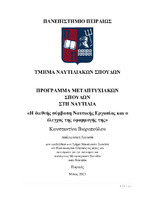Η διεθνής σύμβαση Ναυτικής Εργασίας και ο έλεγχος της εφαρμογής της

Προβολή/
Περίληψη
Η ναυτιλία αποτελεί έναν σημαντικό και απαραίτητο κλάδο του παγκόσμιου εμπορίου
και η ασφάλεια στη θάλασσα είναι υψίστης σημασίας. Για να διασφαλιστεί ότι τα πλοία
τηρούν τα διεθνή πρότυπα και τους κανονισμούς ασφαλείας, έχουν δημιουργηθεί
διάφοροι περιφερειακοί οργανισμοί, όπως το Paris Memorandum of Understanding
εφεξής ως MOU και το Tokyo MOU. Το Paris MOU είναι μια συμφωνία μεταξύ
ευρωπαϊκών χωρών, της Βόρειας Αφρικής και της Ρωσικής Ομοσπονδίας και στόχος του
είναι να εξαλείψει τις υποβαθμισμένες ναυτιλιακές πρακτικές, διασφαλίζοντας ότι τα
πλοία πληρούν τα πρότυπα ασφάλειας, προστασίας και περιβάλλοντος. Το Tokyo ΜOU,
από την άλλη πλευρά, είναι μια συμφωνία μεταξύ χωρών της περιοχής Ασίας-Ειρηνικού,
επικεντρώνεται στη διασφάλιση της ασφάλειας της ζωής και της περιουσίας στη
θάλασσα, στοχεύοντας στα πλοία που έχουν ιστορικό μη συμμόρφωσης με τους διεθνείς
κανονισμούς. Και τα δύο πραγματοποιούν επιθεωρήσεις πλοίων για να διασφαλίσουν ότι
πληρούν τα διεθνή πρότυπα ασφάλειας και περιβαλλοντικής προστασίας. Διατηρούν
επίσης κατάλογο των υποβαθμισμένων πλοίων που έχουν κατακρατηθεί, και τα πλοία
αυτά μπορεί να υπόκεινται σε πρόσθετες επιθεωρήσεις και περιορισμούς στις
μετακινήσεις τους έως ότου πληρούν τα απαιτούμενα πρότυπα. Η αποτελεσματικότητα
των Paris MOU και του Tokyo MOU όσον αφορά τη βελτίωση της ασφάλειας της
ναυτιλίας έχει αποδειχθεί από τη μείωση του αριθμού των υποβαθμισμένων πλοίων και
την αύξηση του αριθμού των πλοίων που πληρούν τις προδιαγραφές. Επιπλέον, τα
MOUs έχουν βελτιώσει την επικοινωνία και τη συνεργασία μεταξύ των κρατών λιμένων
και των πλοιοκτητών, οδηγώντας σε μια ασφαλέστερη και πιο βιώσιμη ναυτιλιακή
βιομηχανία. Συμπερασματικά, το Paris MOU και το Tokyo MOU διαδραματίζουν
κρίσιμο ρόλο στη διασφάλιση της ασφάλειας και της περιβαλλοντικής βιωσιμότητας της
ναυτιλίας στις αντίστοιχες περιοχές τους.


